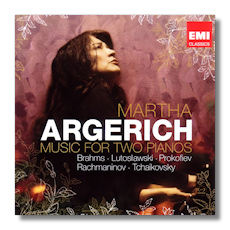
The Internet's Premier Classical Music Source
Related Links
-
Brahms Reviews
Lutosławski Reviews
Prokofieff Reviews
Rachmaninoff Reviews
Tchaikovsky Reviews - Latest Reviews
- More Reviews
-
By Composer
-
Collections
DVD & Blu-ray
Books
Concert Reviews
Articles/Interviews
Software
Audio
Search Amazon
Recommended Links
Site News
 CD Review
CD Review
Martha Argerich Plays Music for Two Pianos

- Sergei Rachmaninoff:
- Suite #2, Op. 17 1
- Six Morceuax for Piano 4-Hands, Op. 11 2
- Johannes Brahms:
- Sonata in F minor, Op. 34b 3
- Haydn Variations, Op. 56b 3
- Piotr Ilyitch Tchaikovsky:"Nutcracker Suite" 4
- Serge Prokofieff: Symphony #1 5
- Witold Lutosławski: Paganini Variations 6
Martha Argerich, piano
1 Gabriela Montero, piano
2 Lilya Zilberstein, piano
3 Polina Leschenko, piano
4 Mirabela Dina, piano
5 Yefim Bronfman, piano
6 Giorgio Tomassi, piano
EMI 207623-2 2CDs 146m DDD
I wanted to be fooled, hoping that these were unreleased recordings. Call it wishful thinking! Instead, everything on this pair of CDs has already been released elsewhere within one of EMI's compilations of music from the Lugano Festival. These live performances were recorded there between 2002 and 2005. Oh well. At least this two-disc set is being sold for the price of one. If you love music for two pianos and don't like the "intrusion" of other instruments in your chamber music – or if you don't want to hear an Argerich-less performance – this release will be useful.
This is a bracing collection of music for two pianos. Most of the works were composed for that medium. The works by Tchaikovsky and Prokofiev are recent arrangements by proficient pianists, and both of them have been brilliantly effected. The identity of Brahms' Sonata in F minor might cause some to scratch their heads, but this is nothing more than the Piano Quintet in F minor, in its earlier incarnation.
Argerich is a star pianist. I don't know anything about her ego, but I do respect her passion for collaborating with other musicians, some of them much younger than she is. Earlier in her career, she expressed dissatisfaction with the life of a solo concert pianist, and claimed that she felt "lonely" when she performed by herself on stage. Here, she couldn't sound less lonely. In fact, what distinguishes these performances is the feeling that the performers are having a great time, loving the music and loving each other's company. Joy in music-making is not something one can quantify, but there's no mistaking its presence here, in abundance. How easily it is transmitted to the listener, and shared with him or her!
Some have complained that Argerich's playing can sound too driven. One could make that argument for most of the performances here – the two works by Brahms are more relaxed – yet I think most listeners will respond positively to the electricity that is being generated throughout. Argerich's studio recordings of this repertory are good. I think these are better, though. In my experience, Argerich is at her best when an audience is present.
The engineering team captures an attractive live ambience, letting the listener feel that he or she is there in the auditorium with the performers and with other audience members, but without letting various sonic distractions take over.
If you haven't explored Argerich's other Lugano releases on EMI, consider getting this one as a sampler. I expect you'll get hooked.
Copyright © 2009, Raymond Tuttle




















